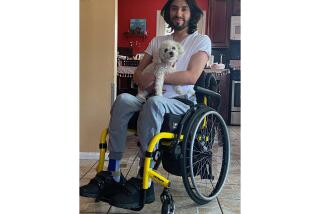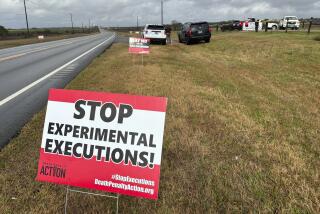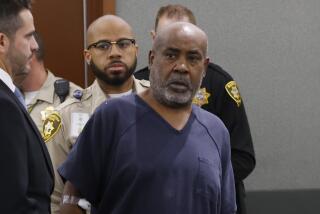In-Law Pleads No Contest in â87 Shooting
An hour before his brother-in-law was scheduled to testify against him from a hospital gurney Monday in San Fernando Municipal Court, Donald Franklin Smith pleaded no contest to a 1987 shooting that left the injured man paralyzed.
But Smith has not been charged in a second shooting--three weeks ago--which left brother-in-law Keith A. Curry partially blinded. That May 31 shooting occurred on the morning Curry originally was scheduled to testify against Smith. No suspects have been identified in the later shooting, authorities say.
âWe canât really say Mr. Smith is the only one who had a motive for shooting Mr. Curry,â Deputy Dist. Atty. Myron Jenkins said. A third attempt on Curryâs life occurred in 1986, when a bomb blew up inside his Porsche, seriously injuring his leg, Jenkins said.
Smithâs no-contest plea will be treated like a guilty plea, Jenkins said. It means that Smith has waived his right to a trial and, therefore, will be convicted of attempted second-degree murder in the Sept. 29, 1987, shooting.
Jenkins said a plea-bargain agreement, which may have shaved four years off Smithâs prison sentence, was reached after he showed Smith authorization from doctors that Curry had recovered enough from the second shooting to be a competent witness.
In the first shooting incident, Curry was sitting in a car parked on a Pacoima street when Smith allegedly pulled up next to him and shot him in the neck, leaving Curry paralyzed.
In the second shooting, Curry was shot twice in the head as he lay in bed shortly after midnight. He subsequently lost the sight in one eye, Jenkins said. Since then, Curry has been guarded by Los Angeles police officers, Jenkins said, and now is eligible for a victim relocation program.
Smith also pleaded no contest to drug and weapons charges related to the 1987 shooting and arrest. The combined charges could bring his total sentence to 13 years, Jenkins said. Smith will remain free on $200,000 bail until his September sentencing in San Fernando Superior Court, which Jenkins said might be postponed until December.
Jenkins said he was pleased with the plea-bargain agreement because it represented a middle ground between the attempted first-degree murder conviction he wanted--which could have carried a 17-year sentence--and the lesser assault with a deadly weapon conviction that juries often favor.
âI find itâs very difficult under existing state of law to prove a premeditated murder attempt,â which is necessary to prove an attempted first-degree murder case, he said.
More to Read
Sign up for Essential California
The most important California stories and recommendations in your inbox every morning.
You may occasionally receive promotional content from the Los Angeles Times.










